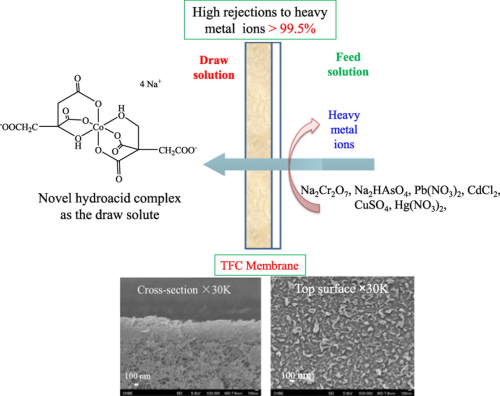
In this study by researchers in Singapore and Saudi Arabia, a novel forward osmosis (FO) process for the removal of heavy metal ions from wastewater has been demonstrated for the first time.
The proposed FO process consists of a thin-film composite (TFC) FO membrane made from interfacial polymerisation on a macrovoid-free polyimide support, and a novel bulky hydroacid complex Na4[Co(C6H4O7)2]·2H2O (referred to as Na–Co–CA) as the draw solute to minimise reverse solute flux.
The researchers successfully demonstrated the removal of six heavy metal solutions: Na2Cr2O7, Na2HAsO4, Pb(NO3)2, CdCl2, CuSO4, Hg(NO3)2.
Water fluxes around 11 L/m2/h were harvested with heavy metals rejections of more than 99.5% when employing 1M Na–Co–CA as the draw solution to process 2000 ppm (1 ppm = 1 mg/L) heavy metal solutions at room temperature.
This FO performance outperforms most nanofiltration (NF) processes. In addition, the high rejections were maintained at 99.5% when a more concentrated draw solution (1.5M) or feed solution (5000 ppm) was utilised.
Furthermore, rejections greater than 99.7% were still achieved with an enhanced water flux of 16.5 L/m2/h by operating the FO process at 60°C.
The impressive heavy metal rejections and satisfactory water flux under various conditions suggest great potential for the newly developed FO system in the treatment of heavy metals wastewater.
Journal of Membrane Science, Volume 467, 1 October 2014, Pages 188–194.




